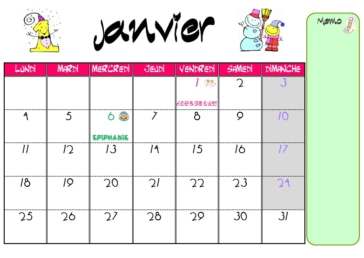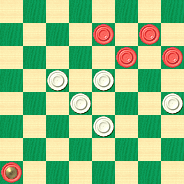The Checker Maven
Jump to navigationM. January

Yes, it's janvier, meaning "January" in French, and Janvier happens to be the name of the old-time American checker player and writer, J.D. Janvier, to whom today's study in our Checker School series is attributed.

WHITE
White to Play and Win
W:W14,15,18,20,23:B7,8,11,12,K29.
Black has the early king. Still, White is about to go a piece up, but Black will quickly even the count. How can White win? This problem is rather easier than most of our Checker School studies, but it's interesting nonetheless. Trouvez la solution and then click on Read More to verify your answer, read the explanatory notes, and play through a sample game.![]()
Solution
As always, lettered notes and general commentary are from Ben Boland's Famous Positions in the Game of Checkers. Numbered notes are by the Editor, using the KingsRow computer engine and 10-piece endgame database.
15-10, 29-25, 10-3, 25-22, 14-9, 22-15, 3-7 White Wins---1.
Game: 11-15, 22-18, 15-22, 25-18, 8-11, 29-25, 4-8, 24-20, 10-15, 26-22, 7-10, 27-24, 10-14, 24-19, 15-24, 28-19, 6-10, 31-26, 2-7, 32-28, 9-13, 18-9, 5-14, 22-18, 1-5, 18-9, 5-14, 25-22, 11-15, 30-25, 15-24, 28-19, 8-11, 22-18, 14-17, 21-14, 10—17, 25-21, 17-22, 26-17, 13—22, 19-15, 3-8, 21-17---2, 22-26, 17-14, 26-30, 15-10, 30-25---A,3. Forms position at 2nd move. Duffy's Single Corner, Variation 37 at E.
A---30-26 is given to draw by James P. Reed.
1---12-16 7-3 8-12 3-8 and Black is out of safe moves.
2---Flawless play up to this point. 15-10 would have been better, but the game is still a draw.
3---Was this an outright blunder? 30-26 indeed would have drawn handily: 30-26 10x3 26x19 14-9 19-23 18-14 23-18 14-10 18-23 etc., to a draw; but not 18-14 9-6 14x7 3x10 12-16 6-2 8-12 2-7 White Wins.
The above position may be found as No. 48 in Spayth’s American Draughts Player, 1860.
Compare to Sturges’ Position, Page 170.
You can email the Webmaster with comments on this article.
